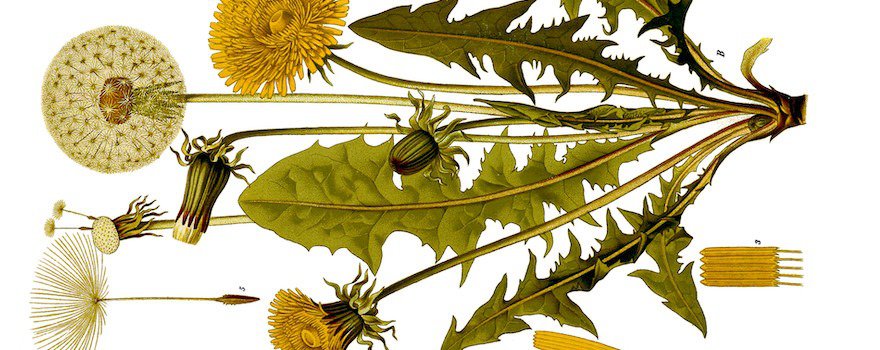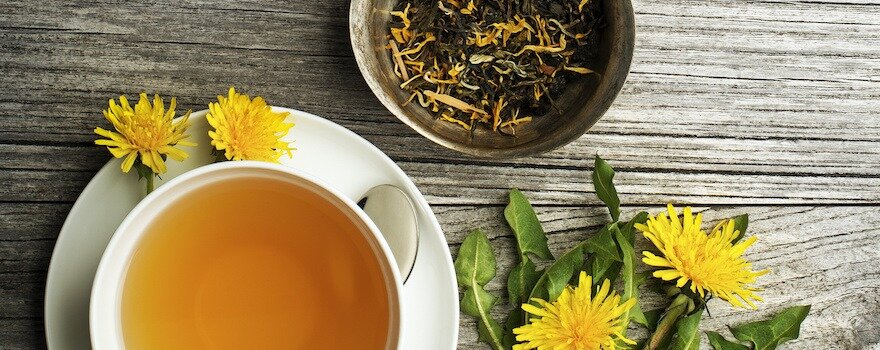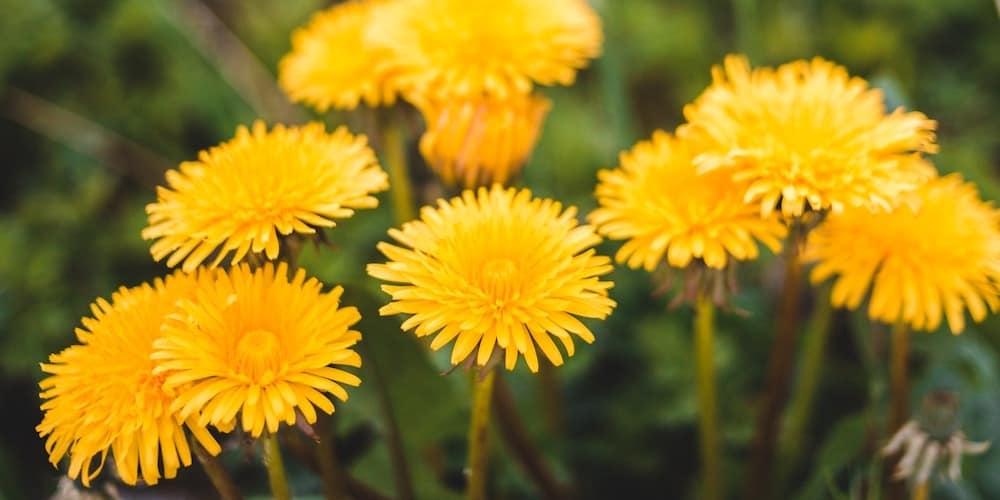What is the dandelion?
Like the stinging nettle and the horsetail, the dandelion is a common plant in our gardens. It belongs to the Asteraceae family and to the botanical genus Taraxacum.
It includes different species, the best-known of which is the Taraxacum officinale or « common dandelion
Widespread in Europe, it grows in gardens, meadows, along paths… It is easily recognizable by its yellow flowers that appear from April to September. Its toothed leaves have earned it the nickname « lion’s tooth ».
The dandelion is an important plant in phytotherapy. Known since antiquity, it is used in many traditional medicines.
Its roots and leaves contain various active compounds (proteins, vitamins, minerals, antioxidants…) that give it medicinal properties.
Thus, it is one of the best natural diuretics that promote drainage and the elimination of toxins. Its consumption also helps stimulate appetite, improve diabetes, and relieve digestive issues. Finally, it shows potential anti-cancer properties.
Nutritional composition
- Amino acids
- Vitamins : provitamin A (beta-carotene), B1, B2, B6, B9, C, E
- Minerals and trace elements : magnesium, potassium, iron, manganese, calcium, phosphorus, sodium, copper, silica
- Proteins
- Carbohydrates
- Fiber
- Fatty acids
- Antioxidant compounds : sterols, flavonoids, polyphenols, carotenoids, taraxasterol
- Organic acids : chicoric acid, chlorogenic acid, malic acid, malonic acid, tartaric acid, citric acid, quinic acid, succinic acid, acetic acid, formic acid

Benefits of the dandelion
🍽 Stimulates appetite
Its consumption is indicated to treat a lack of appetite and loss of appetite. It is notably used in patients undergoing chemotherapy, which often leads to anorexia. Thus, it prevents weight loss while promoting food intake.
Thanks to its bitter components (sesquiterpene lactones), it exerts an appetizing effect. It is also choleretic and cholagogue. Thus, it stimulates bile secretion and biliary functions, which play a direct role in appetite.
This study from Kyung Hee University in Seoul (Korea), carried out in cancer patients, shows how dandelion stimulates appetite.
💦 Diuretic
The plant’s leaves are particularly rich in potassium (about 400 mg per 100 g). This mineral salt contributes to diuresis, that is to say to the formation and to the elimination of urine by the kidneys and bladder.
Thus, dandelion causes an increase in urinary frequency and volume, useful for treating certain conditions such as kidney stones. Its diuretic action also makes it effective in cases of water retention and edema.
This study from the Tai Sophia Institute in Laurel (United States), conducted in humans, shows the diuretic effects of dandelion.
♻️ Relieves digestive issues
In herbal medicine, it is recommended to relieve dyspepsia and various digestive disorders: slow and difficult digestion, constipation, flatulence and intestinal bloating…
On the one hand, its bitter constituents give it stomachic properties that improve digestion and support the functions of the stomach.
Furthermore, it contains fiber (about 3 g per 100 g) that contribute to proper intestinal function. Finally, it stimulates the growth of probiotic bacteria (bifidobacteria) within the gut microbiota.
This study from the Czech University of Agriculture in Prague (Czech Republic), conducted on bacterial strains, shows the effect of dandelion on the microbiota.
🍭 Improves diabetes
Its consumption allows better control of type 2 diabetes (diabetes mellitus). A benefit that it owes to chicoric and chlorogenic acids, taraxasterol, and the sesquiterpene lactones of its roots.
On the one hand, it reduces blood sugar levels and helps regulate blood glucose. On the other hand, it stimulates the pancreas to produce insulin.
This review from Aarhus University Hospital (Denmark) shows the antidiabetic activity of dandelion.
🔬 Potentially anti-cancer
The plant contains many antioxidant compounds with anti-cancer potential. Thus, it is rich in vitamin A (beta-carotene), polyphenols, and flavonoids.
These compounds inhibit the proliferation of diseased cells. In addition, they stimulate tumor necrosis factor (TNF-alpha), which is involved in the fight against cancer cells. Finally, they induce apoptosis (programmed cell death).
This study from the University Children’s Hospital of Essen (Germany), conducted on cells, shows the anti-cancer potential of dandelion.

How to consume dandelion?
Dandelion capsules
The capsules contain powder of dandelion leaves or roots. Roots are more suited to relieve digestive disorders, diabetes, and stimulate appetite. The leaves, meanwhile, act more on the urinary tract.
It’s a convenient form, easy to take, and does not have the bitterness of the powder. If possible, opt for plant-based capsules.
Dandelion powder
The plant parts are harvested, dried and then finely ground to obtain a powder. Again, this may be dandelion leaf or root powder. Choose the one best suited to your needs.
The powder mixes easily into a glass of water. To reduce its bitter flavor, you can also consume it in fruit or vegetable juice or in plant-based milk.
Dried dandelion
It is possible to find dried leaves or roots. This form is ideal for preparing decoctions and des diuretic herbal teas.
Use one tablespoon of dried roots or leaves for 200 ml of water. Let infuse 10 minutes and enjoy. Sugar, honey, or lucuma powder will soften its bitter taste.
Dandelion mother tincture
In this case, the whole flowering plant is used. The mother tincture is obtained by hydroalcoholic extraction. This form is rich in active compounds but contains alcohol. That is why it is not recommended for pregnant women, children, or people with certain health conditions.

Consume sustainably: prioritize organic, local, and fair-trade dandelion
✓ You can easily pick them in the wild. Harvest the young leaves in spring, and the roots in spring or autumn. Prefer places free from any pollution and chemical treatments (pesticides, herbicides…).
✓ Many French producers also cultivate dandelion. In that case, prefer organic farming.
Dosage
The dosage recommended is 30 g of leaves and 15 g of roots per day.
Contraindications and side effects
Dandelion consumption has certain contraindications :
- As a precautionary measure, it is not recommended for pregnant and breastfeeding women and for young children ;
- People suffering from gallstones, kidney failure, or heart conditions should consult their doctor before consuming it ;
- Its consumption may interact with diuretic medications. Ask your doctor if you are taking medication ;
- People allergic to plants in the Asteraceae family may be sensitive to it.
Consumption of dandelion presents certain side effects :
- Stomach aches
- Skin rashes
- Diarrhea
If you experience side effects, stop taking it and consult a doctor.
Sources and scientific studies
Katrin Schütz, Reinhold Carle, Andreas Schieber, 2006. Taraxacum–a review on its phytochemical and pharmacological profile.
Sang-Mi Woo, Kang Min Lee, Gyu Ri Lee, Ji Youn Park, Hee Jae Lee, Hyo-Jung Bahn, Hyun Seok Yoon, Jem Yung Kim, Young Cheol Shin, Sung-Gook Cho, Seong-Gyu Ko, 2018. Novel herbal medicine LA16001 ameliorates cisplatin-induced anorexia.
Bevin A Clare, Richard S Conroy, Kevin Spelman, 2009. The diuretic effect in human subjects of an extract of Taraxacum officinale folium over a single day.
I Trojanová, V Rada, L Kokoska, E Vlková 2004. The bifidogenic effect of Taraxacum officinale root.
K Menke, M Schwermer, J Felenda, C Beckmann, F Stintzing, A Schramm, T J Zuzak, 2018. Taraxacum officinale extract shows antitumor effects on pediatric cancer cells and enhance mistletoe therapy.



